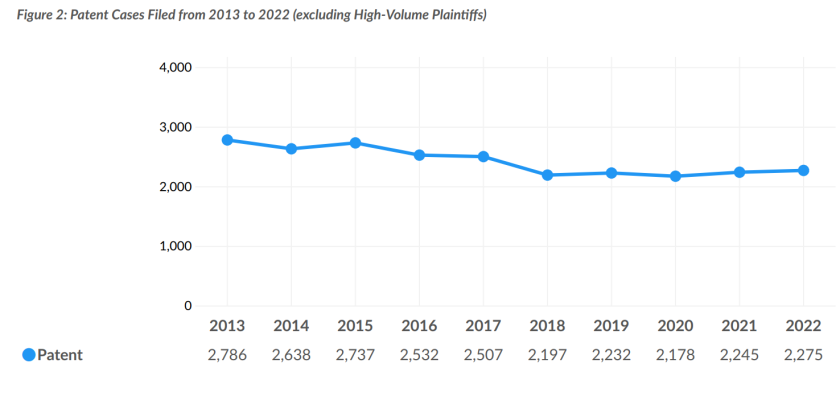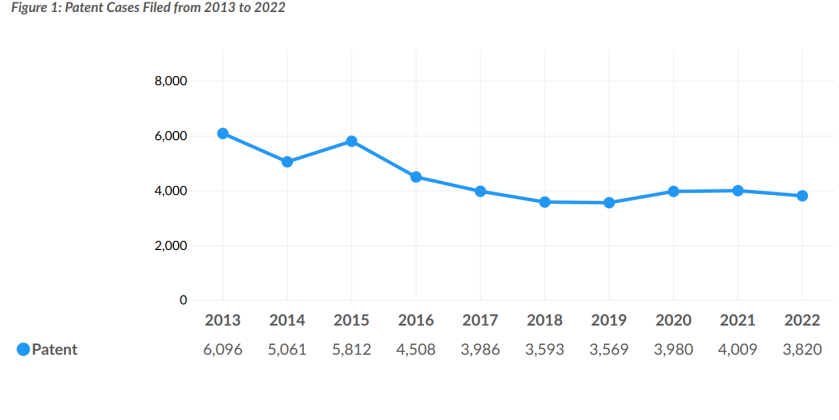From 2013 to 2017 patent suits filed dropped by 35% and stayed that way through 2022.
Excluding volume patent litigation filers, typically non-practicing entities (NPEs) wishing to monetize acquired patents through licensing or a damages award, suits are still down 21% from 2013 to 2018.
Early 2023 indications show the trend toward fewer suits is growing.
Some say there were too many suits pre-America Invents Act legislation (2012), many without merit. Others argue that the Patent Trial and Appeal Board (PTAB) and high cost and long timeline of patent litigation have discouraged those who would otherwise have enforced their rights from doing so. There is little reason today for many tech business to take a license. As a result, many patent holders report that if they wish to discuss an out-license, they must first sue to be taken even somewhat seriously.
There are more granted patents than ever (some four million active as of 2022). It appears that the high cost and difficulty winning damages has discouraged many legitimate businesses and inventors with good inventions from upholding their rights. This provides a powerful edge to a relative handful of businesses, who get to determine what is innovative, effectively, what they can own or control.
The lack of venture capital and private equity funding for tech and the higher cost of capital, in general, could possibly increase the desire to license inventions and know-how on the part of tech businesses and entrepreneurs.
Shareholders vs. Patent-owners
The “efficient infringement” strategy of many tech businesses is beneficial to their bottom line and, in turn, shareholder value, even if it defies ethical practices. The “so sue me” strategy is an impediment for patent holders who believe their rights are being infringed and lack the capital ($3M to $10M or more), time and experience to persevere. It is also an impediment to invention. While difficult to quantify, theft of IP rights, intentional or not, impacts the quality of innovation and the ability to finance and grow new industries and remain competitive with China.
Some believe there would be far more patent litigation suits if they were more winnable. There would also be more licenses and settlements, as there were in the 1990s and 2000s. All but a few IP owners abhor litigation, but without the ability to engage in a meaningful licensing dialogue, suits have become a fact of licensing life.
Innovation draws the short straw. Tech companies’ relatively unfettered access to invention discourages many new businesses from growing, industries from emerging, inventors from creating and investments from being made. It strengthens the output of incumbent businesses, who get to determine what is truly inventive, not coincidentally, what they can own or control.
Most important, the unrestricted use of the patented inventions of others spells trouble for innovation and entrepreneurs, who, despite their initial zeal, are often inclined to give up before they start.
Is Patent Theft Criminal?
Award-winning inventor and professor at Northwestern”s Segal Design Institute, where his students include engineers and product designers, Dan Brown thinks there needs to be criminal penalties for willfulness.
“It would be rarely applied,” said the entrepreneur who is a member of the USPTO’s Public Patent Advisory Committee, who are appointed by the Commerce Secretary in conjunction with the USPTO Director. “But it would certainly give companies who infringe routinely a reason to think twice about their behavior.”
There are established criminal penalties for some copyright and trademark violations, why should there not be for patents, where the stakes can be higher? The potential for jail time would encourage executives to be more reasonable, and perhaps designate in-licensing as a reasonable cost of doing business.
Factoring out high-volume filers, patent litigation is down and has stayed that way and has crept lower since 2017.

Patent infringement is often inadvertent. However, with claims tracking tools and generative AI getting better all of the time, violators will only be able to defend themselves from willfulness claims for only so long.
Double Standard
Whether or not criminal penalties are appropriate for invention-related theft may depend on how the U.S. responds to infringement of U.S. company IP rights on the part of China. If it is criminal for nations like China and some foreign businesses to infringe U.S. patents internationally, it is perhaps an even more heinous act for companies to do so domestically.
Image source: Lex Machina


Very interesting column. Thank you.
LikeLike